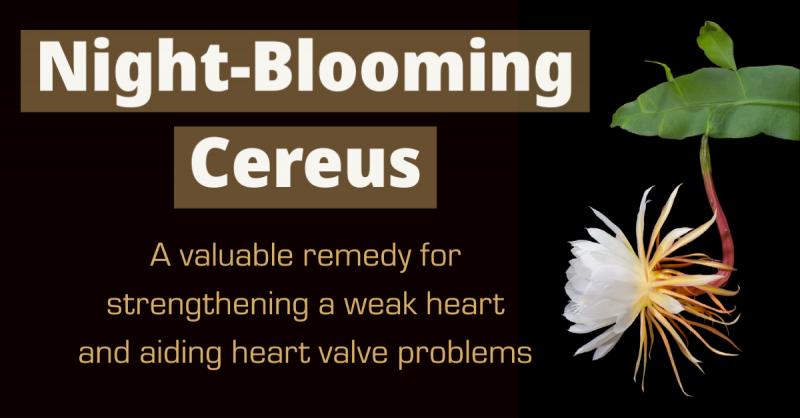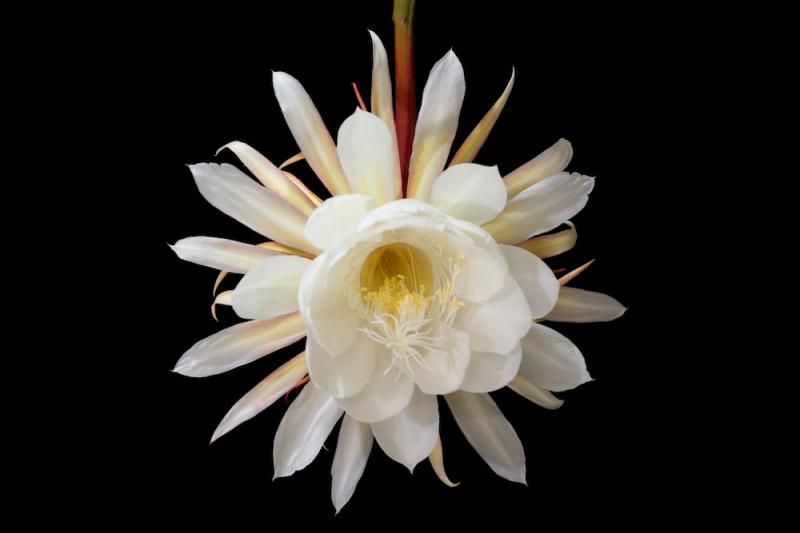
In the spirit of the article I wrote last week about arjuna, I'd like to share another herb that can be used for the heart besides the well-known Western herb, hawthorn. This potential heart remedy is night blooming cereus, a species of cactus that blooms at night.
This species of cactus is used for all types of cardiopulmonary disorders, including angina, tachycardia, palpitations, and valvular disease. It has an effect like digitalis, but milder, which puts it in a similar category of heart remedies as lily of the valley. It stimulates the action of the heart and has been used to aid recovery from heart attacks and combines well with hawthorn and motherwort for this purpose.
It is considered a specific remedy for heart valve problems. It doesn’t close valves that aren’t closing properly, or repair damaged valves, but it does help to support the heart muscle so that the heart functions better in spite of the valve disorders. Like arjuna, it can also be used to help repair heart damage in smokers.
Specific Indications and Dosing
 Matthew Wood gives the following specific indications for night blooming cereus in his book The Earthwise Herbal. These include pressure in the chest, difficulty breathing, and sighing from oxygen deficiency as the person tries to gasp for air. The pulse is rapid but feeble. The person has a tendency to anxiety and may be thin and nervous. Problems also tend to be worse at night.
Matthew Wood gives the following specific indications for night blooming cereus in his book The Earthwise Herbal. These include pressure in the chest, difficulty breathing, and sighing from oxygen deficiency as the person tries to gasp for air. The pulse is rapid but feeble. The person has a tendency to anxiety and may be thin and nervous. Problems also tend to be worse at night.
Using this cactus combined with mimosa may be useful for people suffering from emotional heartbreak. It may also be helpful as a remedy for depression with a sense of panic and foreboding. The person has an apprehension of danger.
Night blooming cereus is a professional strength botanical. I have never used it as a single remedy. I’ve always added it to one of my custom cardiac formulas. I haven’t used it much because most people don’t muscle test for it. However, even when they do, I use it as only a small part of the formula as it’s needed in small amounts, typically just 1-3 drops, diluted in water and taken once or twice daily. You can also find it in certain heart health formulas and formulas to reduce anxiety.
Steven's Articles
-

-
Eucommia Bark
A superior tonic that promotes kidney, structural,…
January
-

-
Goldenthread, Phellodendron, and Yellow Root
Three herbal remedies containing the infection-fighting…
-

-
Teasel
A traditional herb for healing bones and joints…
-

-
Barberry and Healthy Personal Boundaries
A thorny shrub for fighting infections and supporting…
December
-

-
The Evidence for Berberine
A yellow alkaloid found in traditional infection-fighting…
-

-
The Sensible Use of Caffeinated Herbs
Kola nuts, guarana, and yerba mate and other herbs…
-

-
The Health Benefits and Problems with Coffee
This popular caffeinated beverage can be beneficial…
October
-

-
Understanding Caffeine & Cellular Adaptation
Preserving the power of caffeine's buzz and the…
September
-

-
Horseradish
A pungent spice for aiding protein metabolism…
-

-
Banaba or Crepe Myrtle
A beautiful tree from Southeast Asia whose leaves…
August
-

-
Monkeyflowers
Flower essences to help see ourselves more clearly…
-

-
Mariposa Lilies
Strengthening the bond between mother and child…
-

-
The Noble Bay Leaf
A common kitchen herb for aiding digestion and…
-

-
Epimedium: Horny Goat Weed
A circulatory stimulant and kidney yang tonic…
July
-

-
The Medicinal and Nutritional Benefits of Apricots
A nutritious fruit and valuable medicinal seed for coughs

